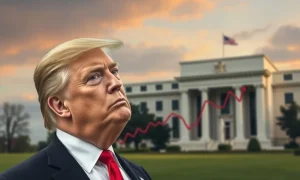A significant conflict is unfolding in the financial sector. Over 80 leading crypto and fintech executives have urgently called on former President Donald Trump to intervene. They want him to prohibit traditional banks from imposing new bank fees for customer data access. This move, they argue, directly threatens their business models and could severely impact the burgeoning digital economy. Understanding this debate is crucial for anyone interested in the future of finance and consumer freedom.
The Push to Ban Bank Fees on Customer Data
A powerful coalition of crypto and fintech executives recently sent a direct letter to Donald Trump. They urged him to block traditional banks from charging fees for customer data access. These executives contend that such fees would stifle consumer choice. Furthermore, they believe these charges could cripple innovation across the financial landscape.
The letter, sent on a Wednesday, clearly accused large banks. It stated that these institutions aim to “preserve their market position.” They plan this by imposing “exorbitant new ‘account access’ fees.” These fees, if implemented, would prevent consumers from connecting their accounts. This connection is vital for accessing better financial products of their choice.
Key industry players backed this significant letter. They included:
- Crypto exchange Gemini
- Trading platform Robinhood
- Crypto lobby group the Crypto Council for Innovation
- The Blockchain Association
This collective voice claimed that the proposed bank fees would cripple several vital U.S. industries. These include the crypto, artificial intelligence (AI), and digital payments sectors. The stakes are clearly very high for the future of digital finance.
Open Banking Rules: A Policy Tug-of-War Over Bank Fees
The current debate over bank fees on customer data has roots in recent policy developments. Former President Joe Biden’s administration introduced a crucial “open banking rule.” The Consumer Financial Protection Bureau (CFPB) finalized this rule in October of last year. It allowed customers to share their bank data with fintech companies for free. This regulation was widely welcomed by the crypto community. They saw it as a step towards greater financial interoperability. However, leading banking industry groups strongly opposed the rule. They subsequently sued the regulator to block its implementation.
Donald Trump’s initial stance on this rule was noteworthy. He first sided with the banks, aiming to kill the regulation. However, he later backtracked in late July. This shift came after significant pressure from the crypto lobby. The Trump administration then informed a judge it would leave the rule in place. This temporary measure allows time to create a new, potentially revised, policy. This reversal highlights the growing influence of the crypto industry in political circles.
Why Crypto Relies on Open Data and Fears New Bank Fees
Crypto companies fundamentally rely on banking data. This reliance explains their strong opposition to new bank fees. Crypto exchanges, for example, need this data. It helps them connect users’ bank accounts to their platforms. This connection allows for easier bank-to-exchange transfers. Without seamless data access, the process becomes cumbersome. This could deter new users and slow down market growth.
In their letter, the crypto and fintech executives clearly articulated their concerns. They stated that bank data fees could “cripple innovative products.” Some products might even shut down entirely. This outcome, they argued, could significantly hurt Trump’s crypto-related policy goals. Trump has campaigned on making the U.S. a “safe harbor” for crypto innovation. The industry has also supported his presidential run with substantial financial contributions.
The letter emphasized America’s leadership position. “America’s ability to lead in the responsible development of digital assets depends on safe, reliable on-ramps connecting our banking system to the new ecosystem,” the letter read. It warned of dire consequences if these connections are severed. “Severing this connection will drive innovation offshore and diminish U.S. influence.” The executives urged Trump to use his full power. They want him to prevent large institutions from raising new barriers to financial freedom.
Banking Groups Hit Back: “Government Price Fixing”
The banking industry quickly responded to the executives’ letter. Banking groups, led by the American Bankers Association, pushed back forcefully. They accused the crypto and fintech coalition of seeking to “undermine free markets.” They also claimed the group aimed to “engage in government price fixing.” This strong language highlights the deep divide between the two sectors.
The banks pointed out what they perceive as a “double standard.” They argued that crypto and fintech companies charge fees for their services. Yet, they expect banks to provide the same service to these private companies for free. “The double standard these companies want perpetuate, where they may charge fees for service while banks are expected to provide the same service to these private companies for free, is absurd,” a banking representative stated. They dismissed the letter as an attempt by “middlemen trying to mislead” Trump. They suggested the crypto sector wants to benefit from Biden-era policies for “personal profit.” Banks also claim the crypto industry wants to “free ride off the major investments banks have made in protecting consumers’ data.”
Broader Tensions: Beyond Data Bank Fees
The dispute over data bank fees is not an isolated incident. The banking and crypto sectors have been at odds on several fronts recently. For instance, this same week saw banking groups urging Congress to address stablecoins. They claimed a loophole allows stablecoin issuers to pay yields on their tokens through affiliates. This ongoing friction suggests a deeper systemic conflict. It pits established financial institutions against emerging digital finance models. The core of this conflict often revolves around regulation, market control, and consumer protection.
The Road Ahead: Implications for Consumers and Innovation
The outcome of this debate over bank fees for customer data will have far-reaching implications. For consumers, it could mean either greater financial freedom or increased barriers to accessing innovative products. If banks succeed in implementing high fees, it could limit choices. It might also make it more expensive to use services that connect different financial accounts. Conversely, if the fees are banned, it could foster a more competitive and integrated financial ecosystem. For the industry, the decision will shape the landscape of fintech and crypto innovation in the U.S. It will determine whether the country remains a leader in digital assets or sees innovation driven offshore.
This ongoing discussion underscores the dynamic nature of the financial industry. It highlights the constant tension between traditional structures and disruptive technologies. The Trump administration’s final decision will be a critical factor in defining the future of financial services for years to come.
Frequently Asked Questions (FAQs)
What are the bank fees that crypto and fintech executives want banned?
These are proposed “account access” fees that traditional banks want to charge for allowing fintech and crypto companies to access their customers’ financial data. This data is essential for connecting bank accounts to digital platforms.
Why do crypto and fintech companies need access to customer bank data?
Crypto exchanges and fintech apps use this data to facilitate seamless transfers between users’ bank accounts and their platforms. This allows for easier deposits, withdrawals, and overall management of funds within digital financial services.
How would these bank fees impact the crypto and fintech industries?
Executives argue that these fees could “cripple innovative products” or even shut them down entirely. They believe it would increase operational costs, stifle consumer choice, and potentially drive financial innovation out of the United States.
What was the “open banking rule” and how does it relate to this issue?
The “open banking rule,” finalized by the CFPB under the Biden administration, allowed customers to share their bank data with fintechs for free. It aimed to promote competition and consumer choice. This rule is central to the current debate, as the proposed bank fees would counteract its intent.
What is the banking industry’s argument against banning these fees?
Banking groups argue that banning these fees would be a form of “government price fixing” and would undermine free markets. They claim that crypto and fintech companies are seeking a “free ride” on the significant investments banks have made in data security and infrastructure, while themselves charging for their services.
What is Donald Trump’s stance on this issue?
Trump initially sided with banks against the open banking rule but later shifted his position after pressure from the crypto lobby. His administration has indicated it will keep the existing rule in place while it works on a new policy, suggesting he is open to considering the crypto industry’s concerns about bank fees.
























